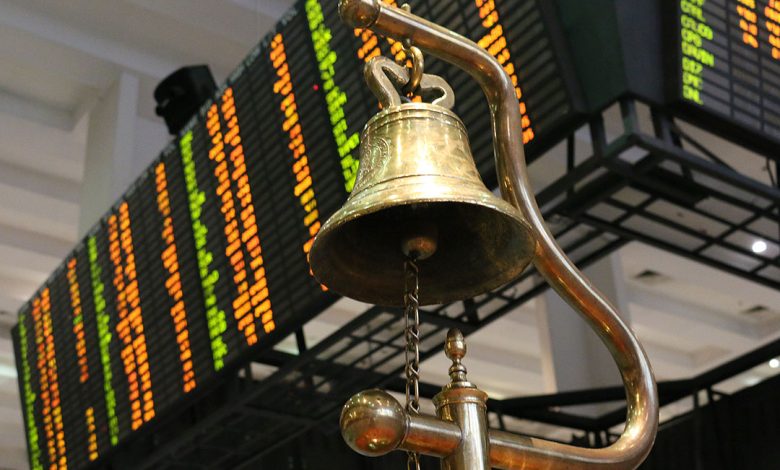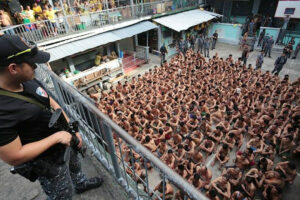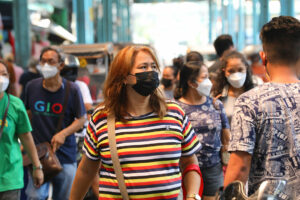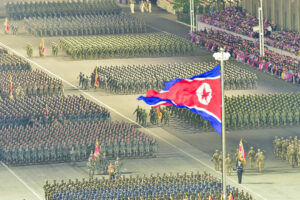Virus, polls, policies seen to sway market in 2022

By Keren Concepcion G. Valmonte, Reporter
THE benchmark Philippine Stock Exchange index (PSEi) will take its cue from the country’s pandemic situation and the upcoming national elections, as well as updates on key monetary policies, analysts said.
“The market may initially depend on how the Omicron variant is contained both in the country and abroad,” Timson Securities, Inc. Trader Darren Blaine T. Pangan said in an e-mail on Dec. 28.
“Eventually, investors may be looking forward to corporate earnings and economic reports to search for clues on how and where we lie in the road to economic recovery,” he added.
All sectoral indices closed in the red on Dec. 31 after the Health department reported an increase in the coronavirus disease 2019 (COVID-19) cases. The 30-member PSEi dropped 211.93 points or 2.88% to close at 7,122.63, while the broader all shares index gave up 65.26 points or 1.68% to 3,818.12.
For 2022, RCBC Securities, Inc. expects the index to close the year at 8,000, while China Bank Securities Corp. set its baseline target to 7,800.
“Stronger-than-expected growth provides potential for this target,” China Bank Securities Research Director Rastine Mackie D. Mercado said in an e-mail on Dec. 29.
Meanwhile, Timson Securities placed the key resistance level at 8,060, while pegged its support at 7,000.
Analysts said the index will be affected by the country’s pandemic situation and the emergence of other COVID-19 variants, monetary policy tightening, and uncertainty surrounding the upcoming elections and administration.
“COVID-19, it’s still the main risk for the market moving forward,” Japhet Louis O. Tantiangco, senior research and engagement supervisor at Philstocks Financial, Inc., told BusinessWorld in a virtual call on Dec. 29.
China Bank Securities’ Mr. Mercado said the “fluid nature of the pandemic will likely drive volatility as developments arise.” In the last week of 2021, the market logged a three-day rally before dropping on Dec. 31 when the country’s COVID-19 infections rose.
“I think valuations will be more sensitive to tighter liquidity conditions and growth expectations,” Mr. Mercado said.
Meanwhile, RCBC Securities President Raul P. Ruiz expects the country’s gross domestic product (GDP) growth to “normalize as the country learns to live with the pandemic.”
“[COVID-19 will have] diminished importance, only to be remembered whenever there are resurgences, but with less impact as the vaccination rate increases,” he said in an e-mail on Dec. 21.
Mr. Ruiz expects the PSEi to end the year at 8,000 “with most of the gains happening in the fourth quarter,” driven by the country’s improved vaccination rates and relaxed restrictions to reach that level.
“This would allow corporate earnings to recover, with most of them returning to pre-pandemic levels. In addition, both GDP and corporate earnings would get further uplift from election spending,” Mr. Ruiz said.
Analysts said they are monitoring issues from cyclical industries, such as those in the banking and property sectors on top of other stocks that may benefit from an economic reopening, such as travel and tourism, and gaming issues.
Philstocks Financial’s Mr. Tantiangco said investors are already on a wait-and-see mode for the elections, with investors keeping their eyes on the candidates’ platforms.
“They want to see what the candidates’ plans are and more specifically, which of these candidates will be most friendly to the market, which of these candidates can be considered economic, and investment-friendly,” Mr. Tantiangco said.
Both RCBC Securities’ Mr. Ruiz and China Bank Securities’ Mr. Mercado expect election-related concerns to escalate in the second quarter, or as Mr. Mercado said, “after full-year 2021 earnings” are reported.
The country will be holding national elections on May 9, 2022.
“If the outcome is unfavorable to the business community, [election-related worries will] fester in the third quarter,” Mr. Ruiz said.
“However, barring any radical unpopular actions by the new government, we expect companies and investors to move on to ‘business-as-usual’ by the fourth quarter,” he added.
Meanwhile, the exit of foreign investors is “likely to be much less of a concern” compared to what happened in 2013 to 2014.
“Foreign funds haven’t been really flowing into our market over the past three years, so weakness from foreign fund outflows will likely be tempered,” China Bank Securities’ Mr. Mercado said.




